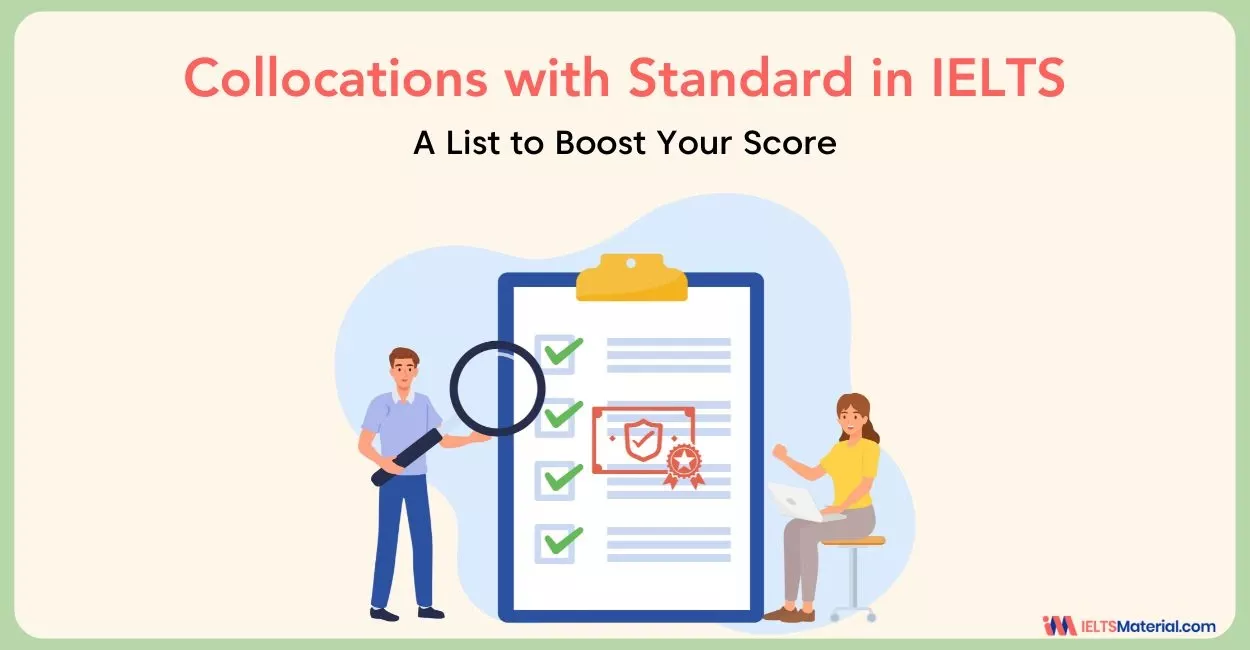Reason Collocation for IELTS: A List to Boost Your Score
Enhance your writing and speaking skills using advanced reason collocations for IELTS. Understand meanings, explore examples, and complete engaging exercises to expand vocabulary and achieve greater fluency and accuracy for a high IELTS band score.
Table of Contents

Limited-Time Offer : Access a FREE 10-Day IELTS Study Plan!
In IELTS Writing and Speaking, the word ‘reason’ plays a crucial role when you are asked to explain causes, justify opinions, or describe motivations. So, whether you are writing ‘The main reason for pollution is industrial waste’, or saying, “I can’t see any reason to disagree…”, using reason collocations for IELTS shows a high level of lexical precision.
Therefore, in this blog, we will explore different reason collocations with advanced vocabulary word lists for IELTS, categorized into verbs, adjectives, and other useful combinations, to help you enrich your vocabulary.
Lists of Reason Collocations for IELTS to Boost Your Score
Many IELTS learners rely on basic phrases like ‘the reason is because’ or ‘for many reasons’. However, these can sound repetitive or even grammatically incorrect. To sound natural and academic, you need to know common verbs, adjectives, and expression-based reason collocations.
Therefore, we will explore lists of different reason collocations for IELTS in the tables below for a better IELTS vocabulary score. Each table will have the meanings and original example sentences for the specific collocation.
Verb + Reason Collocations
These reason collocations are essential for explaining or identifying causes in IELTS Writing and Speaking.
|
Verb + Reason |
Meaning |
Example Sentence |
|---|---|---|
|
Explain a reason |
to describe why something happens |
It’s difficult to explain the reason behind this economic shift. |
|
Give a reason |
to provide justification or cause |
The writer gives several reasons for supporting public transport. |
|
Know the reason |
to be aware of the cause |
No one knows the real reason for his sudden resignation. |
|
Have a reason |
to possess a motive or justification |
People have good reasons for choosing online education. |
|
Understand a reason |
to grasp the cause or motivation |
I can understand the reason why students prefer to study abroad. |
|
See a reason |
to find justification or logic |
I don’t see any reason to delay the project. |
|
State a reason |
to express the cause clearly |
Candidates should state the reasons for their answers in Writing Task 2. |
|
Find a reason |
to identify or discover why something happened |
Scientists are trying to find the reason for the rise in global temperatures. |
|
Provide a reason |
to supply justification |
The company provided reasons for the delay in product delivery. |
|
Search for a reason |
to look for an explanation |
Psychologists often search for reasons behind human behavior. |
Common Adjective + Reason Collocations
Adjectives with ‘reason’ help describe the type, strength, or clarity of a cause. These are particularly helpful for academic writing and discussion questions in IELTS Speaking Part 3.
|
Adjective + Reason |
Meaning |
Example Sentence |
|---|---|---|
|
Apparent reason |
an obvious or visible cause |
There was no apparent reason for the sudden drop in sales. |
|
Particular reason |
a specific or distinct cause |
I don’t have any particular reason for choosing that brand. |
|
Sentimental reason |
an emotional cause |
Some people keep old belongings for sentimental reasons. |
|
Main reason |
the most important cause |
The main reason for urban pollution is the overuse of private vehicles. |
|
Simple reason |
a clear and uncomplicated cause |
He failed the test for the simple reason that he didn’t prepare. |
|
Valid reason |
a logical and acceptable cause |
There’s no valid reason to reject renewable energy investment. |
|
Good reason |
a strong or fair justification |
Governments have good reasons to limit smoking in public places. |
|
Clear reason |
a reason that is easy to understand |
There is no clear reason why unemployment rates remain high. |
|
Obvious reason |
a reason that is easily noticed |
For obvious reasons, people avoid travelling during storms. |
|
Logical reason |
a cause based on rational thinking |
A logical reason for the delay could be funding issues. |
Common Expressions with ‘Reason’
These are everyday patterns that you can use flexibly in both spoken and written English, especially when explaining or justifying an argument in IELTS.
|
Expression |
Meaning |
Example Sentence |
|---|---|---|
|
The reason for |
used to explain the cause of something |
The reason for this trend lies in rapid technological development. |
|
The reason why |
used to specify a cause |
The reason why people migrate is often linked to better opportunities. |
|
For this/that reason |
used to connect cause and effect |
For that reason, governments should invest more in education. |
|
For some reason |
used when the cause is unclear or unknown |
For some reason, the results were lower than expected. |
|
Without reason |
without any justification |
You shouldn’t blame others without reason. |
|
With good reason |
rightly or justifiably |
Many people fear AI automation, and with good reason. |
|
For no apparent reason |
when something happens unexpectedly |
The internet connection stopped working for no apparent reason. |
|
Have every reason to |
to be fully justified in doing something |
Students have every reason to demand better facilities. |
|
No reason to |
no cause or justification |
There’s no reason to panic about minor issues. |
|
A reason to believe |
grounds or justification for assuming something |
There’s reason to believe that climate change is accelerating. |
Prepositional and Common Phrase Collocations
These structures are frequently used in IELTS Writing Task 2 essays to show cause-and-effect or logical reasoning.
|
Collocation |
Meaning |
Example Sentence |
|---|---|---|
|
For a reason |
for a specific cause |
Every law exists for a reason — to maintain social order. |
|
To reason with someone |
to try to persuade through logic |
Teachers often try to reason with students instead of punishing them. |
|
By reason of |
because of (formal) |
He was exempted from service by reason of poor health. |
|
Reason behind |
the underlying cause |
The reason behind rising costs is inflation. |
|
Reason out |
to think through logically |
Scientists reasoned out the process behind genetic mutation. |
|
Good reason for concern |
valid cause for worry |
There is good reason for concern about global warming. |
|
Reason enough |
sufficient justification |
That’s reason enough to support stricter environmental laws. |
Notes
|
Reason Collocation for IELTS: Practice Exercises
To improve your understanding and usage of the reason collocations, which are essential for the IELTS exam, we are providing you with an opportunity to work through several exercises that are presented below.
Exercise A: Use the correct form of these verbs. Then underline the verb collocations.
| explain | give | know |
| have | understand | see |
- Mel and Frank______every reason to be unhappy. He lost his job last year and now she’s been told she might lose hers!
- I______no reason for us to depart from our usual practices in this hospital. We will treat the Prime Minister just like any other patient.
- I could______you any number of reasons for not going to Elizabeth’s party. But just tell her that I’m not feeling very well.
- I’d like to______the reason why you’re so late.
- He died suddenly at the age of 21 and the doctors are at a loss to______the reason for his sudden death. A second autopsy will have to be held.
- I don’t______the reason why computers can’t repair themselves. I would have thought someone could write a program.
Exercise B: Use the following adjectives in these sentences.
| apparent | particular | sentimental |
| main | simple | valid |
- Our son isn’t going to university for the______reason that he can’t afford it. And neither can we.
- Why do you want to know her name? > Oh, no______reason. I was just wondering.
- She kept all her late husband’s letters and diaries for______reasons. They reminded her of all the good times that they had together.
- Do you have a______reason for being absent from work or did you just take a day off?
- For no______reason, the man opposite me in the train suddenly got up and started screaming and shouting. I think he must have been ill.
- The Guardian may be left-wing, but that’s not why I buy it. The______reason I read it is because it reports places that other papers don’t.
Exercise C: Complete the sentences with these words.
| for | to | why |
- The wonderful weather in the winter is our main reason______choosing to live in Portugal.
- There’s no earthly reason______you should feel guilty. The accident had nothing to do with you.
- There’s no reason______be concerned. He has a temperature, but he’ll be fine in the morning.
- There’s no rhyme or reason______her behaviour. One day she’s nice, the next she’s really nasty.
- I expect there’s some good reason______them not turning up. I’m sure they’ll phone.
- There’s no reason______we shouldn’t win. We have the best players and they’re on top form.
- Sue had every reason______be angry. Jerry shouldn’t have taken her car without her permission.
Answer Keys for Practice Exercises Reason Collocations
Ex A:
- have
- see
- give
- know
- explain
- understand
Ex B:
- simple
- particular
- sentimental
- valid
- apparent
- main
Ex C:
- for
- why
- to
- for
- for
- why
- to
To conclude, mastering reason collocations for the IELTS exam is key to expressing your ideas clearly, logically, and fluently in the exam. Whether you are writing an essay about the reasons for climate change or speaking about the reasons behind your career choice, the right collocations can elevate your language and make your responses sound more natural and academic. So next time, instead of saying “because of this,” try “for this reason” or “there’s every reason to believe…”, and you will sound like a confident Band 8+ candidate.
Useful Links:
- 'An Act of' Collocation for IELTS: A List to Boost Your Score
- Measure Collocation for IELTS: A List to Boost Your Score
- Using Collocation to Boost Your IELTS Score - Key Word: Cause
- Using Collocation to Boost Your IELTS Score - Key Word: Argument
- Practical Tips on How to Improve Vocabulary for the IELTS Exam

Start Preparing for IELTS: Get Your 10-Day Study Plan Today!
Learn more Collocations

Kasturika Samanta

Nehasri Ravishenbagam

Kasturika Samanta

Kasturika Samanta
Recent Articles

Nitika Gupt

Nehasri Ravishenbagam

Nehasri Ravishenbagam





Post your Comments